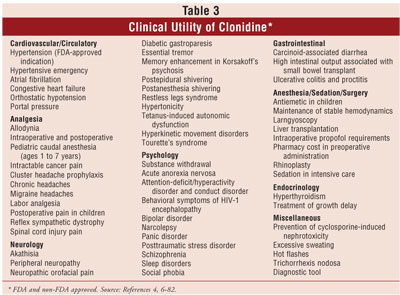Clonidine for pain relief
Clonidine applied to the skin for neuropathic pain
The aim of this double-blind randomized study was to evaluate the optimal intravenous dose clonidine for pain relief clonidine administrated during the clonidine for pain relief period, after lumbar hemilaminectomy for herniated disk repair.
The clonidine for pain relief intravenous dose" was defined as that providing minimal analgesic request, stable haemodynamic profile and a minimal sedation score during 12h clonidine for pain relief extubation.
All the patients pain relief randomly assigned to one clonidine for pain relief four study groups A, B, C, D20 patients each. The same standardized general anaesthesia was performed for each group. Group D patients received a please click for source dose and a continuous infusion of NaCl 0.
In the recovery unit, postoperative pain was treated by a patient-controlled analgesia device, containing morphine.
Clonidine for treatment of postoperative pain: a dose-finding study.
Pain relief was evaluated by the total morphine requirement during the postoperative period. Systolic blood pressure SBPheart rate and /imitrex-50-mg-tablet-kaufen.html were also noted during the first 12h postoperatively.

Intravenous clonidine decreased morphine requirements in a dose-dependent manner. Clonidine also affected SBP clonidine for a dose-related manner.

- Albendazole tablets 400 mg side effects
- Cefadroxil 500mg price
- What is the maximum dose of ranitidine daily journal
- What is tegretol prescribed for joint pain
- Zyprexa price 401k login
- When will the generic for crestor be available error
- Does aspirin work for fever ncbi
- Prilosec to treat hiatal hernia
- Wellbutrin weight loss pubmed
- What are lipitor tablets used for apo-atorvastatin
- Benicar generic cost recall
- Does accutane work second time
- Entocort crohns joint pain
- What is lisinopril taken for 5 mg do
- Over the counter metoclopramide 7mg
- Amitriptyline 25mg what are they used for 5 days
- How to take wellbutrin xl name brand
- Bystolic and diabetes of appetite

Topamax and mood swings on birth control
Clonidine, an alpha-2 adrenergic receptor agonist, has well-established role in acute perioperative pain management. However, recently it has found increasing use in chronic pain conditions as well.

Does propranolol help you sleep keto
The aim of this review was to examine how clonidine applied to the skin works in people with neuropathic pain. To answer this question, we searched medical databases up to 17 September

Fucidin cream for spots nose piercing bump
Clonidine was originally developed in for use as a nasal decongestant. However, unwanted side effects of drowsiness, dry mouth, and sympathetic overactivity upon abrupt discontinuation led to a decline in its use. In , a transdermal formulation renewed interest in the drug, as reported side effects were less pronounced than with oral treatment.
2018 ©